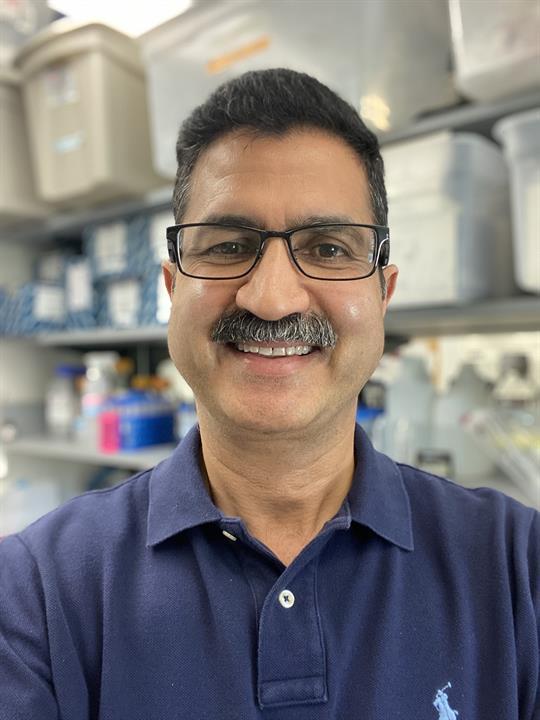-
About
- Leadership & Faculty
- News & Events
-
Admissions
-
Academics
- Graduate
- Advanced Clinical Training
- Continuing Education
- Academic Departments
- Academic Offices
- Simulation Experiences
-
Student Life
- Offices
-
Research
-
- Transformative Research
-
-
Hospitals & Clinics
- Emergency Care
- Hospital Services
-
Community Outreach
- Volunteer

Abhineet Sheoran
B.V.Sc., M.V.Sc., Ph.D.

Research/Areas of Interest
Immunology and pathogenesis of human/zoonotic infectious agents; Immunotherapy for hemolytic uremic syndrome (HUS) that can develop following infection with Shiga toxin-producing E. coli; Vaccine development for cryptosporidiosis and leptospirosis
Education
- Doctor of Philosophy, Univ Of Cambridge, GBR, 1996
- Master of Veterinary Science, Haryana Agricultural Univ, IND, 1991
- Bachelor's of Veterinary Sci., Haryana Agricultural Univ, IND, 1989
Biography
Associate Professor Abhineet Sheoran, DVM, PhD, is an immunologist and infectious disease specialist with >15 years of experience on immunology, immunotherapy of toxin-mediated diseases, animal models, and development of vaccines for mucosal pathogens. He jointly runs a program to develop a therapy for hemolytic uremic syndrome (HUS) and a vaccine for cryptosporidiosis with Professor Saul Tzipori. He teaches in several courses in the DVM and graduate programs and directs a course on immunology. He is the director of the twelve-month Master of Science in Infectious Disease and Global Health degree program.
Dr. Sheoran's laboratory is engaged in preclinical evaluations of antitoxin agents against Shiga toxin 1 (Stx1) and Stx2 of enterohemorrhagic E. coli (EHEC) in animal models. Stx1 and Stx2 are associated with HUS following infection with EHEC that people contract by eating contaminated vegetables or undercooked meat.
Another project in Dr. Sheoran's laboratory is to develop a vaccine for cryptosporidiosis, an infection caused by the enteric pathogens Cryptosporidium parvum and C. hominis. Cryptosporidiosis is a globally important zoonotic disease, which is second only to rotavirus as a cause of diarrhea in children < 2 years of age in sub-Saharan Africa and South Asia. Cryptosporidium also causes sporadic diarrheal illness in industrialized countries, including the US. Currently, there is no effective therapy or vaccine against this disease.
Before coming to Tufts, Dr. Sheoran did his doctoral work on equine humoral immunity at the University of Cambridge, England, and pursued his interests in the same field during post-doctoral training at the University of Kentucky, where he worked on developing mucosal vaccines and investigating virulence factors of equine microbial pathogens.
Dr. Sheoran's laboratory is engaged in preclinical evaluations of antitoxin agents against Shiga toxin 1 (Stx1) and Stx2 of enterohemorrhagic E. coli (EHEC) in animal models. Stx1 and Stx2 are associated with HUS following infection with EHEC that people contract by eating contaminated vegetables or undercooked meat.
Another project in Dr. Sheoran's laboratory is to develop a vaccine for cryptosporidiosis, an infection caused by the enteric pathogens Cryptosporidium parvum and C. hominis. Cryptosporidiosis is a globally important zoonotic disease, which is second only to rotavirus as a cause of diarrhea in children < 2 years of age in sub-Saharan Africa and South Asia. Cryptosporidium also causes sporadic diarrheal illness in industrialized countries, including the US. Currently, there is no effective therapy or vaccine against this disease.
Before coming to Tufts, Dr. Sheoran did his doctoral work on equine humoral immunity at the University of Cambridge, England, and pursued his interests in the same field during post-doctoral training at the University of Kentucky, where he worked on developing mucosal vaccines and investigating virulence factors of equine microbial pathogens.